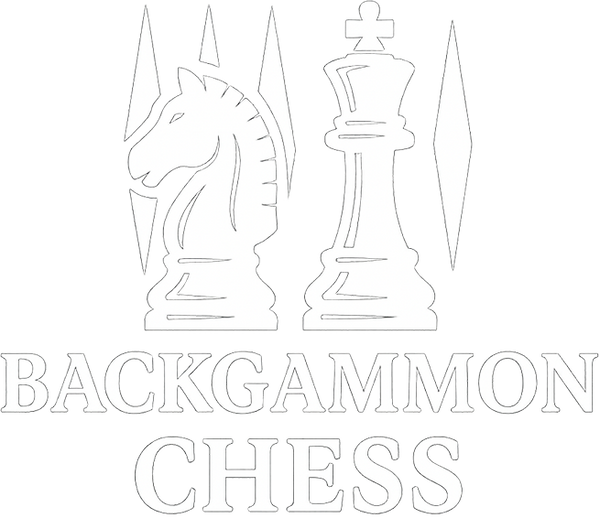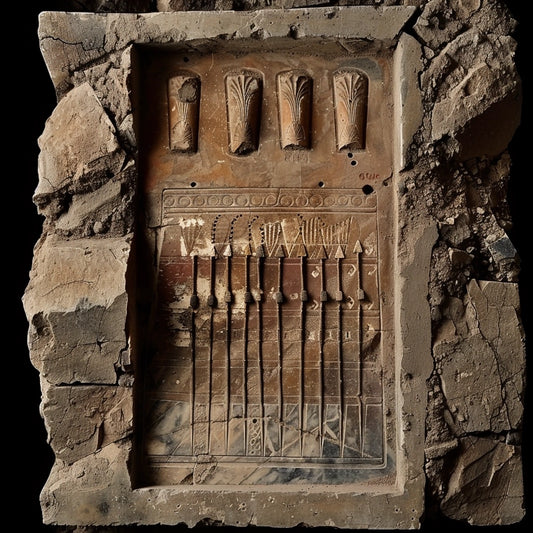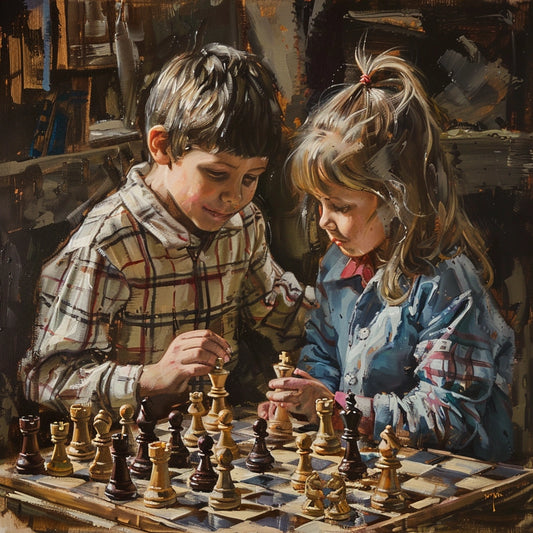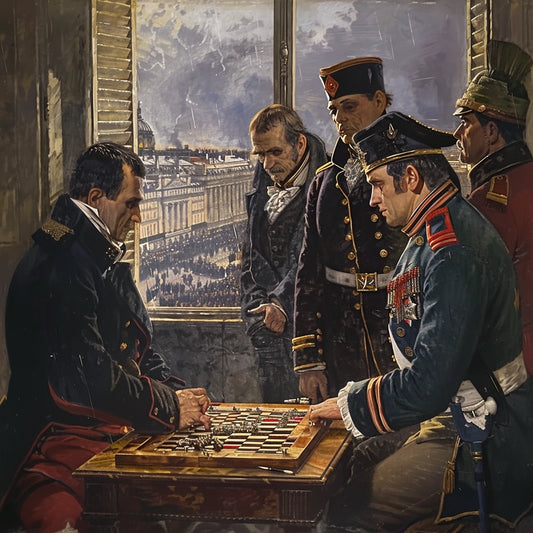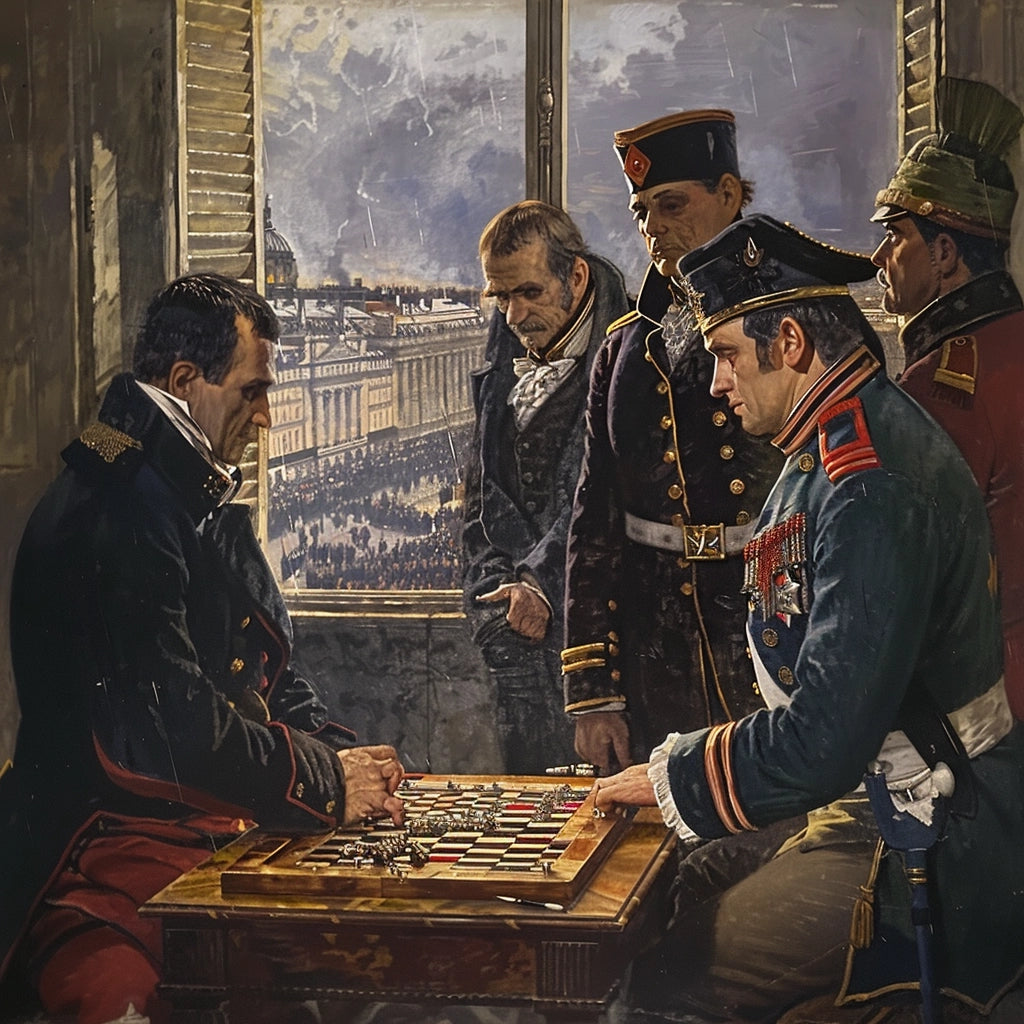
Historical and Contemporary Personalities passionate about Chess and Backgammon
Introduction
Throughout the ages, chess and backgammon were not just simple board games, but real bridges between cultures, eras and social strata. These ancient games, steeped in history and tradition, have captivated enlightened minds from all over the world, becoming symbols of intellectual sophistication and pure strategy. From the royal courts of Europe to the drawing rooms of modern intellectuals, chess and backgammon have been more than a pleasant pastime; they were and still are a battleground of minds, a space where tactics and foresight meet in a fascinating dance.
This universal appeal is no accident. Chess, with its mysterious origins, and backgammon, one of the oldest known board games, offer a unique combination of intellectual challenge and aesthetic pleasure. They test not only players' strategic skills, but also patience, anticipation and even creativity. It's fascinating how, despite the seemingly simple rules, every game is full of infinite possibilities and unexpected moments of genius.
The historical and contemporary figures who embraced these games did not do so just for fun or relaxation. For many, chess and backgammon were tools for sharpening the mind, ways to better understand opponents and plan several moves ahead, valuable skills both on the board and in real life. This article aims to explore the deep connections between these personalities and the games they loved, showing how the passion for chess and backgammon transcends time and space, uniting people of all ages and from all corners of the world in a global community of strategic thinking and the appreciation of beauty.
1. Royalty and Political Leaders
Napoleon Bonaparte, one of the world's most influential military leaders, had a known fondness for chess. It is said that he perfected his battle strategies by studying the game of chess, reflecting his tactical skills on the game board. Napoleon preferred an aggressive style, attacking quickly and without hesitation, an approach that also characterized his conduct on the battlefield. A notable example is his match with General Bertrand in 1820 on the Island of Saint Helena, which demonstrates his preference for offensive games. For more details, historical works on Napoleon and his hobbies often provide insights into his passion for chess.

King Charles II of England is often cited for his role in popularizing backgammon among the European nobility. After the restoration of the English monarchy in 1660, Charles brought with him from exile a predilection for this game, which was enthusiastically received at the English court. Charles not only played backgammon frequently, but also encouraged the game to be contested in his social circles, thus helping to spread it throughout Europe. Cultural history books and archival documents from the period can provide further evidence of this trend.
Catherine the Great (Catherine II of Russia), Empress of Russia, was known for her intelligence and political acumen, but also for her love of chess. It is said that he always had a chess set close by and often invited his courtiers and visitors to chess games. The game was both a form of entertainment and a means of evaluating and developing complex strategies, which served them in governing the vast Russian empire. Biographies and writings about Catherine the Great often refer to this aspect of her life.

2. Writers and Philosophers
Benjamin Franklin , one of the Founding Fathers of the United States, was not only a statesman, inventor and diplomat, but also a lover of chess. Franklin saw chess not just as a game, but as an opportunity to learn valuable lessons about life and morality. In his essays, he promoted chess as a tool for personal improvement, emphasizing the importance of foresight, prudence, and critical thinking. His essay, "The Morals of Chess," published in 1786, is considered one of the first works to explore the philosophy and ethics behind the game of chess, highlighting how strategies and decisions made on the chessboard can reflect and influence behavior in real life.

TS Eliot , winner of the Nobel Prize for Literature, is another emblematic example of the influence of chess on the literary world. Eliot was not only fond of chess, but also incorporated elements of the game into his literary work. In his complex and dense poem, "The Waste Land," Eliot uses chess-inspired imagery and symbols to convey themes of spiritual search and discovery, reflecting the game's complexity and multiple levels of interpretation. This integration of chess into literature demonstrates the game's ability to serve as a metaphor for the human condition, exploring ideas of strategy, conflict, and resolution in the context of modern life.
Jorge Luis Borges , the Argentine writer and poet, was also an admirer of chess, which he considered a pure art form and a microcosm of the world. Borges wrote several poems and essays in which chess plays a central role, using it as a tool to explore philosophical concepts such as infinity, duality, and destiny. In his work, chess becomes a bridge between the real and the imaginary, between logic and mystery, offering a unique perspective on human nature and the universe.
These writers and philosophers not only embraced chess as a hobby, but recognized and capitalized on its depth and complexity, using the game as a source of inspiration and as a tool for exploring the major themes of human existence. Through their works, they demonstrate how chess transcends the boundaries of a simple game, becoming a reflection of life itself, with all its strategies, challenges and victories.
3. Pop Culture Stars and Celebrities
In the glittering world of celebrity, chess and backgammon offer an escape from the tumult of public life, a space for concentration, strategy and sometimes introspection. These games attract personalities from various fields, from music to cinematography, proving that their appeal transcends cultural and social barriers.
Stanley Kubrick : The famous director Stanley Kubrick, known for his iconic films like "2001: A Space Odyssey" and "A Clockwork Orange", was an avid chess player. Kubrick began playing chess as a teenager and continued to practice the game throughout his life. Chess is said to have had a significant impact on his way of directing, helping him develop complex strategies and anticipate the moves of his opponents, whether it was characters in his films or negotiations in the film industry. Kubrick often used chess to bring his actors and crew together, creating a stimulating and competitive working environment.

Madonna : The queen of pop music, Madonna, is another celebrity known for her love of chess. In various interviews, Madonna has mentioned that chess is one of her favorite ways to relax and keep her mind sharp. She was seen playing chess with her friends and collaborators during tours and breaks from filming. For Madonna, chess is not just a hobby, but an art form that combines discipline with creativity, reflecting the complexity and depth of her own music.
Arnold Schwarzenegger : Actor and former governor of California Arnold Schwarzenegger is another example of a public figure who finds pleasure in playing chess. Schwarzenegger posted photos of himself playing chess on social media, pointing out that it's a game he likes to play in his free time. For Schwarzenegger, chess is more than just a game; it's a metaphor for life, where strategy, anticipation and mental fortitude are essential to success.

These examples highlight how chess and backgammon resonate with individuals from all walks of life, providing a unique platform for intellectual challenge, relaxation and personal development. Celebrities, with their busy schedules and lives under constant scrutiny, find in these strategy games a valuable refuge, proving the universality and timelessness of their appeal.
Scientists and Inventors
Albert Einstein: A Master of Strategic Thinking
Albert Einstein, famous for his theory of relativity and his revolutionary contributions to theoretical physics, was also a chess enthusiast. It is said that Einstein valued chess not only as a form of entertainment, but also as a means to explore and understand the complexity and order of the universe. In a letter to his daughter, Einstein compared the beauty of chess to the structure of the cosmos, emphasizing how both reflect a balance between order and chaos. He was seen playing chess with friends and colleagues, using the game as a creative break from his scientific work.
Steve Jobs: Innovation Inspired by Backgammon
Apple co-founder Steve Jobs is another example of a brilliant mind who found value and inspiration in strategy games. Jobs was known for his love of backgammon, a game he often played during his formative years and in his down time at Apple. Friends and colleagues of Jobs recount that he often brought a backgammon set to meetings and events, promoting the game as a form of mental exercise and a source of inspiration for lateral thinking and innovation. Backgammon, with its need to anticipate one's opponent's moves and manage the element of luck, provided an apt metaphor for Jobs' approach to business and design.

The Contribution of Strategy Games to Scientific and Innovative Thinking
The interest of these personalities in chess and backgammon is not a coincidence. Studies show that strategy games improve critical thinking, problem solving and planning skills - all essential in science and innovation. By training the mind to recognize patterns, anticipate consequences, and devise complex strategies, chess and backgammon provide fertile ground for the development of those cognitive skills that underlie scientific and technological innovation.
In conclusion, the passion of scientists and inventors for chess and backgammon is not only a testament to their appreciation of games as forms of entertainment, but also a reflection of how these strategy games can stimulate innovative and creative thinking. By exploring the complexity and beauty of chess and backgammon, these brilliant minds have found new ways to understand the world around them and push the boundaries of what is possible in their areas of expertise.
